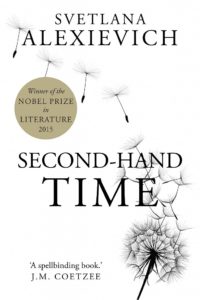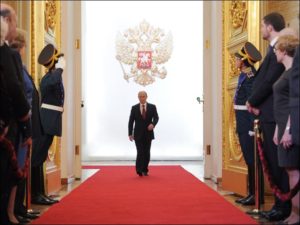Svetlana Alexievich Second-Hand Time: The Last of the Soviets (Translated by Bela Shayevich)

 (My review of Nobel winner Svetlana Alexievich’s Second-Hand Time was published in Scroll on 23 July 2016 with the title” Imagine the tragedy of abandoning Communism without knowing how to live with capitalism”. Here is the link: http://scroll.in/article/812306/imagine-the-tragedy-of-abandoning-communism-without-knowing-how-to-live-with-capitalism. I am c&p the text below too. )
(My review of Nobel winner Svetlana Alexievich’s Second-Hand Time was published in Scroll on 23 July 2016 with the title” Imagine the tragedy of abandoning Communism without knowing how to live with capitalism”. Here is the link: http://scroll.in/article/812306/imagine-the-tragedy-of-abandoning-communism-without-knowing-how-to-live-with-capitalism. I am c&p the text below too. )
Nobel Prize winner (2015) Svetlana Alexievich’s Second-Hand Time: The Last of the Soviets explores what the aftermath of the fall of USSR meant for ordinary folks. Svetlana is a Belarusian journalist who was born in Ukraine, writes in Russian and lived in Paris for nearly 11 years before returning to Minsk to be with her daughter and granddaughter. According to the New York Times, “she had left to protest the regime of the Belarussian president Alexander Lukashenko, who has been in power since 1994 and curtailed press freedom. She said she planned to remain in Minsk and hoped the Nobel would give her some protection and freedom to speak her mind.” Based on interviews carried out between 1991 and 2012, the book was published in Russian in 2013, with the first English edition coming out in 2016.
By the little people consists of a series of transcripts of interviews. Sometimes these are structured thoughts, sometimes ramblings and sometimes monologues. Rarely does Alexievich intrude with comments or even an introduction to the speaker. At most, a reference to the person or the memory being recorded will be acknowledged in the chapter heading, such as “On Romeo and Juliet…except their names were Margarita and Abulfaz”. No wonder Russian-American journalist Masha Gessen calls the 2015 Nobel Prize winner a “memory keeper”.
According to Bela Shayevich, the translator of Second-Hand Time, the book is “an update of 19th-century Russian literature for the 21st century.” People read Russian novels not for the happy endings, she added, but “because there is great catharsis in great pain and then something that is sublime.” Listing it as part of her Summer Reads 2016 in The Guardian, Marina Warner called it “a Greek tragic chorus of memories about the Soviet Union”.
The stories we hear add up to something close to a dystopia created by Communist indoctrination. Having subjected the former Soviet citizens to almost an artificial reality, the regime incapacitated them from understanding the transformation of their society after 1989, when Communism began to fade.
“My mother is not going to help raise my daughter…I won’t let her. If she had her way, my child would only watch Socialist cartoons because they’re ‘humane’. But when the cartoon is over, you have to go out on the street, into a completely different world.” As an ex-Army officer who had fought in Afghanistan told Alexievich, “It’s important to write it down while there are still people around who remember it…we’d work the night shift, unloading train cars, or as security guards. Laying asphalt. The people working alongside me were PhDs, doctors, surgeons. I even remember a pianist from the symphony. …socialism is alchemy.”
What also emerges tragically from these accounts is the fact that ordinary people did not even have the skills to survive in the post-Soviet landscape, after the disintegration of the USSR. They had been brought up to believe in dreams such as the motherland. This is a constant lament in the book – the inability of many people to understand basics, such as what is real money, how it operates, and the value of it. Many did not know how to earn a living in the new socio-economic system, and rapidly sank into poverty.
Distilled testimonies
In an interview to the Dalkey Archive Press when her book Voices from Chernobyl was published, Alexievich said she sees her work as witnessing. She repeated this in her interview to The Millions: “I’m interested in little people. The little, great people, is how I would put it, because suffering expands people. In my books these people tell their own, little histories, and big history is told along the way. We haven’t had time to comprehend what already has and is still happening to us, we just need to say it. To begin with, we must at least articulate what happened.”
In the opening chapter of Second-Hand Time, Alexievich writes of her intent to document the Communist collective memory, which recalls Pravda, Little Octoberists, parades, Solzhenitsyn, Komsomol, and allegiance to the motherland: “In writing, I’m piecing together the history of ‘domestic’, ‘interior’ socialism. As it existed in a person’s soul. I’ve always been drawn to this miniature expanse: one person, the individual. It’s where everything really happens…It never ceases to amaze me how interesting everyday life really is. There are endless number of human truths. History is concerned solely with the facts; emotions are outside of its realm of interest. In fact, it’s considered improper to admit feelings into history. But I look at the world as a writer and not a historian. I am fascinated by people.”
An insight into her fascinating methodology reveals a practice not uncommon amongst those who document oral histories. According to Alexievich, she “selects one out of five interviews, and that one makes it into the published book. For each person I record four tapes or more, making 100-150 printed pages, depending on the voice, timbre and the pace of the oral story, and then only about ten pages remain…”
So the seeming chaos of individual narratives has a strong underlying sense of structure, much like the ordered chaos of Darcy’s garden in Pride and Prejudice. These stream of consciousness testimonials are the common form of recording oral narratives, particularly of women survivors, of a traumatic experience. The form is a testament to the writer’s sensitivity as a listener, allowing the interviewee to speak openly and without fear. These are experiences that, Alexievich is quick to remind us, formed “a large part of our lives – more, even, than love. Thus, the Russian experience of suffering acquires particular value.”
“I grew up in a dissident family…in a dissident kitchen…My parents knew Andrei Sakharov, they distributed Samizdat. Along with them, I read Vassily Grossman, Yevgenia Ginzburg, Dovlatov, listened to Radio Liberty. In 1991, I was, of course, in front of the White House, in a human chain, prepared to sacrifice my life to prevent the return of Communism. Not a single one of my friends were Communists. For us, Communism was inextricably linked with the Terror, the Gulag. A cage. We thought it was dead. Gone forever. Twenty years have passed…I go into my son’s room, and what do I see but a copy of Marx’s Das Kapital on his desk, and Trotsky’s My Life on his bookshelf…I can’t believe my eyes! Is Marx making a comeback? Is this a nightmare? Am I awake or am I dreaming? My son studies at the university, he has a lot of friends, and I’ve started eavesdropping on their conversations. They drink tea in our kitchen and argue about The Communist Manifesto …Marxism is legal again, on trend, a brand. They wear T-shirts with pictures of Che Guevara and Lenin on them. [ Despairingly] Nothing has taken root. It was all for naught.”
The blurb on the dust jacket begins: “What if you could tell history through the countless voices of ordinary people who lived through it?” It is as if in one fell swoop the editors have negated the very existence of the discipline of subaltern history while using the very same idea. Maybe Alexievich’s preferred definition of “witness” would have been more appropriate.
Svetlana Alexievich Second-Hand Time: The Last of the Soviets (Translated by Bela Shayevich) Juggernaut Books, New Delhi, 2016. Hb. Pp. 570. Rs 699
A paragraph that could not be included in the published article for reasons of length is reproduced below:
In the case of Soviet society, in seven decades, they went from the Romanov era, Bolshevik Revolution, Communism ( Stalin et al) and then post-1989 hurtled completely unprepared into a capitalist economy society soon to be dominated by Putin. As Simon Sebag Montefiore says in his magnificently detailed and stupendously rich history of The Romanovs: 1613-1918 says: “It is ironic that now, two centuries after the Romanovs finally agreed a law of succession, Russian presidents still effectively nominate their successors just as Peter the Great did.” ( pxx-xi). And yet Putin, the Russian president’s state symbol is the two-headed eagle that was of the Romanovs too. This direct linkage to the royal period of Russian history refuses to acknowledge the communist era except for the trifle detail of Putin having been an ex-KGB officer, the secret police of the Soviet Union.
( Stalin et al) and then post-1989 hurtled completely unprepared into a capitalist economy society soon to be dominated by Putin. As Simon Sebag Montefiore says in his magnificently detailed and stupendously rich history of The Romanovs: 1613-1918 says: “It is ironic that now, two centuries after the Romanovs finally agreed a law of succession, Russian presidents still effectively nominate their successors just as Peter the Great did.” ( pxx-xi). And yet Putin, the Russian president’s state symbol is the two-headed eagle that was of the Romanovs too. This direct linkage to the royal period of Russian history refuses to acknowledge the communist era except for the trifle detail of Putin having been an ex-KGB officer, the secret police of the Soviet Union.
Simon Sebag Montefiore The Romanovs: 1613-1918 Weidenfeld & Nicolson, London, 2016. Hb. Pp. 746. Rs 1299 ( Distributed by Hachette India)


